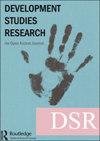COVID-19、疫苗接种和非药品政策对埃塞俄比亚贸易的影响:使用半参数机器学习的结构重力
Q2 Social Sciences
引用次数: 0
摘要
2020年初爆发的新冠肺炎疫情对人类健康和经济产生了重大影响。为了有效管理这场大流行,我们必须平衡经济损失和健康利益。我们必须使用实时数据来实现这一点。目前为埃塞俄比亚提供的文献是基于对covid - 19前宏观经济数据和经济指标的模拟。本研究使用结构重力机器学习半混合效应模型(SMEM)的泊松伪最大似然估计器,估计了COVID-19病例和死亡、疫苗接种和非药物政策对埃塞俄比亚贸易的影响。病例、死亡和严格程度指数都对双边进出口产生统计上显著的负面影响。另一方面,疫苗接种对双边出口和进口都有统计上显著的积极影响。与双边进口相比,埃塞俄比亚的双边出口受到很大影响。进口替代和增加疫苗接种覆盖率和接种率是政策影响。本文章由计算机程序翻译,如有差异,请以英文原文为准。
The impact of COVID-19, vaccination, and non-pharmaceutical policies on Ethiopian trade: a structural gravity using semi-parametric machine learning
ABSTRACT The COVID-19 outbreak in early 2020 had a significant impact on human health and the economy. To effectively manage this pandemic, we must balance economic losses and health benefits. We must use real-time data to accomplish this. The literature currently available for Ethiopia is based on simulations of pre-COVID macroeconomic data and economic indicators. Using a Poisson pseudo maximum likelihood estimator for a machine learning semi-mixed effect model (SMEM) of structural gravity, this study estimated the impact of COVID-19 cases and deaths, vaccinations, and non-pharmaceutical policies on Ethiopian trade. Cases, deaths, and the stringency index all have statistically significant negative effects on bilateral exports and imports. Vaccinations, on the other hand, have a statistically significant positive impact on both bilateral exports and imports. When compared to bilateral imports, Ethiopia's bilateral exports suffer greatly. Import substitution and increased vaccination coverage and rates are the policy implications.
求助全文
通过发布文献求助,成功后即可免费获取论文全文。
去求助
来源期刊

Development Studies Research
Social Sciences-Development
CiteScore
3.20
自引率
0.00%
发文量
20
审稿时长
12 weeks
期刊介绍:
Development Studies Research ( DSR) is a Routledge journal dedicated to furthering debates in development studies. The journal provides a valuable platform for academics and practitioners to present their research on development issues to as broad an audience as possible. All DSR papers are published Open Access. This ensures that anyone, anywhere can engage with the valuable work being carried out by the myriad of academics and practitioners engaged in development research. The readership of DSR demonstrates that our goal of reaching as broad an audience as possible is being achieved. Papers are accessed by over 140 countries, some reaching over 9,000 downloads. The importance of the journal to impact is thus critical and the significance of OA to development researchers, exponential. Since its 2014 launch, the journal has examined numerous development issues from across the globe, including indigenous struggles, aid effectiveness, small-scale farming for poverty reduction, sustainable entrepreneurship, agricultural development, climate risk and the ‘resource curse’. Every paper published in DSR is an emblem of scientific rigour, having been reviewed first by members of an esteemed Editorial Board, and then by expert academics in a rigorous review process. Every paper, from the one examining a post-Millennium Development Goals environment by one of its architects (see Vandermortele 2014), to ones using established academic theory to understand development-imposed change (see Heeks and Stanforth 2015), and the more policy-oriented papers that contribute valuable recommendations to policy-makers and practitioners (see DSR Editor’s Choice: Policy), reaches a multidisciplinary audience.
 求助内容:
求助内容: 应助结果提醒方式:
应助结果提醒方式:


